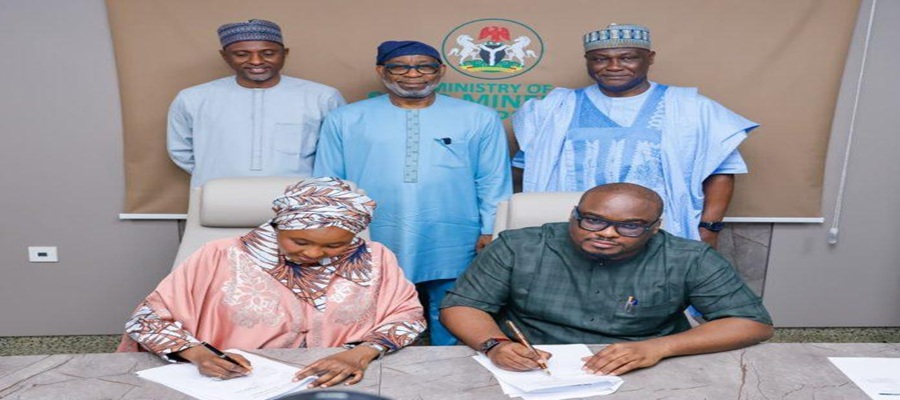News
Buhari to Earn N14.4m, VP Osinbajo N12. 1 Per Annum

Revenue Mobilisation Allocation and Fiscal Commission (RMAFC), has reviewed the salaries of the President, Vice President, Senate President and Speaker of the House of Representatives and Speakers in the 36 states of the federation, as well as well other legislators in both the National and State Assemblies among other public officers in the country.
Based on the total package prepared by the RMAFC, President Muhammadu Buhari‘s annual salary and allowances stand at N14, 4 million.
Vanguard reported that the break down shows that his Basic Salary is N 3,514,705 and Hardship allowance, N 1,757,350:50. Constituency N 8,786,762:50 and Leave Allowance – N351, 470.
Buhari will receive a 400 per cent increase in his salary amounting N14. 058 million, as gratuity upon a successful completion of his tenure.
The Federal Government is to provide him with all his needs including vehicles, Special Assistants, Personal Assistants, entertainment, security, utility bills, newspapers, medical bills and clothings.
The president’s estacode and Duty Tour allowance were not specified.
However, the Vice President is to receive an annual Basic Salary of N2, 064, 400; Hardship allowance- N1, 515, 786.25 and a Constituency Allowance of N7, 578, 931.25, bringing his total annual earning to N12.1million.
According to the Vanguard, about 75 per cent of his annual basic salary would be paid for vehicles and their maintenance if he chooses to buy his vehicles and maintain them.
He is to receive another 25 per cent to hire his Personal Assistants; 75 per cent for domestic staff; 45 per cent for entertainment and 30 per cent for utility.
The VP is to receive a separate 20 per cent of his salary for monitoring; 200 per cent for accommodation and 300 per cent for furniture.
His duty Tour Allowance stands at N 35 , 000 per night and an estacode of $900 per night.
He is to receive 10 per cent of his salary as Leave Allowance and 300 per cent as gratuity upon a successful completion of his tenure.
NATIONAL ASSEMBLY
Also, following a downward review of salaries and allowances of both the National and State Assembly legislators, the Senate President will receive a basic annual salary of N2, 484, 242.50 and allowance of N6. 2 million, bringing the total to N8. 69Million. His monthly salary is about N724, 570.
In addition, he collects 250 per cent of his Annual Salary as Constituency Allowance.
However, his vehicles and their maintenance are provided by the federal government. Similarly, his domestic staff, entertainment, utilities, security responsibility, Legislative Aids, House Maintenance an, as well as a Special Adviser and a Personal Assistant are provided by the federal government.
Similarly Robe (clothing) and newspapers are provided for the Senate President.
The Deputy Senate President enjoys the same benefits except that his Annual Basic Salary stands at N 2,309,166.75, total allowance N 5,772,916.8, bringing total annual salary to 8,082,083.63 and a monthly pay of N 673,506.97
The Senate Majority Leader receives a salary of N12, 968, 960. The Minority leader receives a total annual salary of N12, 908, 168. The Whip receives N12, 867 . The same applies to Committee Chairmen. Incidentally in the last administration almost all senators were chairmen of various committees.
The allowances received by the members of the upper legislative chamber is far more than their salaries indicate.
For instance, each senator receives 75 per cent of the annual salary as allowance for a vehicle and its maintenance. They collect another 75 per cent of their salaries for domestic staff; 30 per cent for entertainment; 30 per cent for utilities; 25 per cent for robe (clothing); and 250 per cent as constituency allowance.
Others include, another allowance unspecified which stands at 53 per cent; newspapers 15 per cent; Personal Assistance, 24 per cent; and House maintenance 5 per cent.
In addition, the Leader receives 10 per cent for Responsibility; Minority Leader 7; while the Whip and Committee chairmen receive 5 per cent for the same purpose.
Ordinary senators receive a basic salary of 2,026,400.00; annual allowance of N10,739,920.00 , bring it to a total of N 12,766,320.00.
Other non-regular allowances include 300 per cent gratuity for the Senate President; and estacode of $1, 00 per night for foreign trips, as well as, a N37,000 per night duty tour allowance.
All the senators who have just finished their terms at the 7th National Assembly are therefore entitled to 300 per cent of the annual salaries as gratuity.
The Deputy senate President gets N32, 000 per night as Duty Tour Allowance.
Senators receive $ 1 000 as estacode and a duty tour allowance of N23, 000 per night.
House of Reps
At the House of Representatives, the Speaker receives a total annual salary of N 4,334,942.50.
Just like the Senate President, the federal government provides his vehicles and their maintenance . His domestic staff, entertainment, utilities, security responsibility, Legislative Aids, House Maintenance an, as well as a Special Adviser and a Personal Assistant are provided by the federal government.
Similarly Robe (clothing) and newspapers are provided for the Speaker by the Federal Government.
He receives 75 per cent of his salary as constituency allowance.
Speaker of the House of Representatives, Hon. Yakubu Dogara after inauguration, yesterday. Photos: Olugbemiga Olamikan/
Speaker of the House of Representatives, Hon. Yakubu Dogara after inauguration, yesterday. Photos: Olugbemiga Olamikan/
The Deputy speaker whose annual salary stands at 4,002,309.94 enjoys similar benefits as the speaker.
The Majority Leader of the House, the Minority Leader, the Chief Whip and Chairmen of Committees receive annual salaries of N 6, 352,680.00. In addition, they receive 50 per cent of their salaries as Vehicle and Maintenance allowance; another 50 per cent for domestic staff; 10 per cent for utilities and another 10 per cent for House maintenance.
In addition, they collect 75 per cent for constituency allowance, 25 per cent for personal Assistant. Other members enjoy similar allowances.
At the House of Representatives, the speaker receives $ 790 estacode per night and N32, 000 per night for domestic trips.
The Deputy Speaker receives $750 and N30, 000 for estacode and Duty Tour, respectively. Members receive $550 and N21 , 000 for estacode and domestic trips , respectively.
Houses of Assembly
Speakers of the State Houses of Assembly enjoy all the benefits as their federal counterpart where virtually all they need are provided with public funds. However, their annual salaries stand at N 2,049,843.75 and a Constituency Allowance of N25 per cent of their Annual Salaries.
Deputy Speaker receives N 1,807,478.13 and 25 per cent of same as constituency allowance.
Members at the House of Assemblies receive annual salaries of N 2,473,866.25.
In addition, they receive 20 per cent for vehicles; 25 per cent for domestic staff, 10 per cent for utilities; 25 per cent each for robe, constituency , Personal Assistant and 5 per cent for newspapers.
The decision to review the current salaries and allowances of the nations’ public office holders received approval of many members of the public who had complained that the Nigerian law makers were about the highest paid in the world. These are the official earnings of these political office holders. But their spoils of office amount to several millions and even billions of naira in recent past.
News
EFCC Arraigns Two FSDH Bank Officials Over $307k, €50k Fraud


EFCC
News
AfDB Supports Francophone Africa Start-ups with €6.5M

The African Development Bank Group last week approved an investment of €6.5 million in the Saviu II fund in order to support technology start-ups through their seed phase and first institutional fundraising, mainly in French-speaking Central and West Africa.

The Bank will invest €4.5 million as equity and €2 million as a first-loss hedging tranche on behalf of the European Commission, under the Boost Africa Programme.
This participation of the Bank Group will enable the Saviu II fund to give priority to companies with a strong technological or digital component.
Saviu II, the second investment vehicle of Saviu Partners, plans to invest between €500,000 and €3 million in about 20 technology or technology-oriented business-to-business start-ups in the seed phase or carrying out first institutional fundraising.
The Saviu II venture capital fund aims to make at least 60% of its commitments in the French-speaking countries of West and Central Africa: Côte d ‘Ivoire, Cameroon, Benin, Senegal, Togo, Burkina Faso and Mali.
The fund can also co-invest in promising technology companies in East Africa that have a strong team and business model, and whose strategy includes entering the market in French-speaking West African countries and establishing a strong presence there.
In addition, the fund will devote a dedicated envelope to pre-seed investments, focusing on minority equity investments, usually in co-investment with studios, incubators or other ecosystem partners.
News
Nigeria Inks $1.3bn MoU with AFC for Alumina Refinery, Mining Push

Nigerian Government has signed a $1.3 billion Memorandum of Understanding (MoU) with Africa Finance Corporation (AFC) via the Solid Minerals Development Fund (SMDF) to fund an alumina refinery, national geoscience mapping, and a strategic investment vehicle for mining growth.

Special Assistant to the Minister of Solid Minerals Development, Segun Tomori, said the refinery will process one million tonnes of bauxite yearly using a modern Bayer process, powered by an on-site gas-fired cogeneration plant.
Minister Dele Alake called it a transformative milestone boosting GDP, aligning with reforms that improve investment climate, regulations, and licensing to attract private capital. He directed agencies to fast-track permits.
The 20-year project at 95% utilization eyes 19 million tonnes total output, $1.2 billion annual GDP addition, $25 billion economic impact, and $8 billion forex earnings, per feasibility studies.
SMDF Executive Secretary Fatima Shinkafi termed it the agency’s biggest funding deal, supporting value-addition policy.
The partnership extends to geoscience mapping for mineral data, de-risking exploration, and a joint vehicle for mining assets.
Permanent Secretary Engr. Farouk Yabo praised the reforms. Shinkafi signed for government; AFC’s Franklin Edochie for the corporation, witnessed by AFC CEO Samaila Zubairu.
Tomori positioned it as Nigeria’s largest private mining investment and FDI magnet.

 Telecom2 days ago
Telecom2 days agoSunil Bharti Mittal Conferred GSMA Lifetime Achievement Award for Transforming Global Telecommunications

 Telecom2 days ago
Telecom2 days agoWhy Digital Trust Matters: Secure, Responsible AI for African SMEs?

 General News2 days ago
General News2 days agoKrishnan Exits Africa Data Centre to Embark on Professional Chapter

 E-Business2 days ago
E-Business2 days agoJumia Tech Week 2026 Begins with Tech Deals on Smartphones, Electronics, and Everyday Technology

 General News3 days ago
General News3 days agoLeo Stan Ekeh at 70; thanks Tinubu, Obasanjo, Nigerians, Global Tech Community

 Broadcasting2 days ago
Broadcasting2 days agoNCAA Orders Overland Airways to Refund VAT Charged on 2025 Tickets

 E-Financial1 day ago
E-Financial1 day agoNRS Targets N40trillion in Tax, Royalty Revenue in 2026

 Telecom2 days ago
Telecom2 days agoHouse Probes Fintech Regulation via Public Hearing on New Commission Bill













